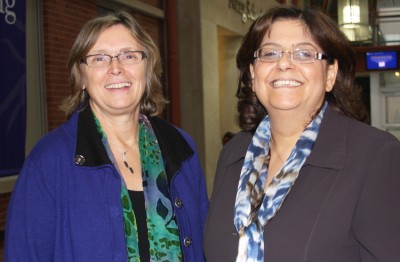
Schools in Jordan and throughout the Middle East will soon be led by administrators as confident and knowledgeable as those who have graduated from the Neag School of Education’s highly rated University of Connecticut Administrator Preparation Program (UCAPP).
As part of a recently announced partnership with the Queen Rania Teacher Academy (QRTA) in Jordan, Neag Educational Leadership faculty will help develop a program and training materials for QRTA staff to use to teach administrators from local and international schools. Led by UCAPP Director Diane D. Ullman, the effort will focus on putting “UCAPP’s best content and concepts into Arabic and a Middle Eastern context.”
“One of the primary commonalities I see in education throughout the world is that successful schools have successful principals,” said Dr. Ullman. “Good principals encourage teachers and unleash their full potential. They create a community where teachers learn from one another.”
In addition to developing the curriculum, Neag faculty will train QRTA staff how to best present the materials. This process will begin in July 2014 when Neag faculty will begin teaching the curriculum to private schools in the region. In the near future the QRTA staff will be prepared to bring the curriculum to the public schools in Jordan
Recognized as one of the top educational leadership programs in the U.S., UCAPP provides courses in educational policy, curriculum leadership and program evaluation for school improvement, supervision and evaluation among other areas.
The Neag School- QRTA collaboration was announced in September, when Ullman presented a “School Leaders Promoting Excellence in Teaching” workshop to 100 school administrators from Jordan and several other Middle Eastern countries.
“Dr. Ullman shows the undeniable connection between good leadership and good teaching, and that coaching goes hand in hand with successful classroom instruction,” said Muna Fityani, communications officer for QRTA. The school was founded in 2009 with the help of Jordan’s Queen Rania to provide training and networking opportunities, professional development, and information about the latest educational research and policies to Middle Eastern school leaders.
As part of her visit to Jordan, Ullman outlined UCAPP courses and introduced several new and proven leadership techniques, including the need for teachers to be observed by principals and receive construction feedback on classroom performance. She also stressed the essentialness of schools establishing an environment of trust. The latter, Ullman said, is a concept that’s rarely been explored by educational leaders in the region.
“Principals need to know how teaching and learning occur, as well as have the ability to inspire and lead,” Ullman said. “It’s a much broader role than many people think, but we’re fortunate at the Neag School to have outstanding instructors that are among the best practitioners anywhere. It’s exciting to know they’ll now be sharing their knowledge and passion for educational leadership to help principals, and other school leaders, from around the world. Through this partnership, the Neag School becomes an even stronger global presence.”
Talks of a collaboration began in 2011, when Ullman—a commissioner for the New England Association of Schools and Colleges—met QRTA Academic Program Advisor Mary Tadros on a trip to evaluate an international school in Germany.
“After we work with Dr. Ullman to create a wholesome leadership program that we can develop to suit local needs, we hope to roll out the program to countries throughout the region,” Tadros said.
Added an equally thrilled Ullman: “This partnership will provide an opportunity for Neag faculty to broaden their international perspective on issues, strategies and practices. And who knows where it may lead. This work could be a doorway into an even more robust cross-cultural educational leadership exchange between our two organizations.”
 Facebook
Facebook
 Twitter
Twitter
 LinkedIn
LinkedIn
